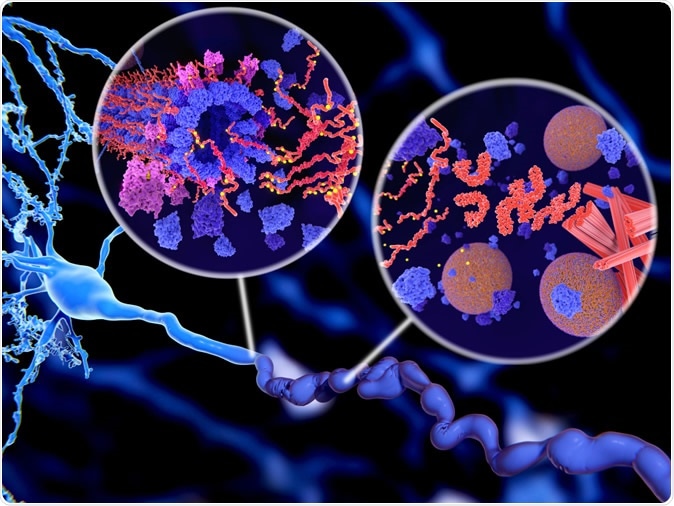Scientists have come up with a new drug which could prevent patients with features of Alzheimer’s disease (AD) from suffering memory loss and brain damage.
This drug, called BPN14770, stops toxic effects resulting from the presence of beta-amyloid, the hallmark protein that forms the characteristic plaques in AD. By inhibiting a key enzyme called phosphodiesterase 4D (PDE4D), it helps prevent memory loss, preserve dendritic number and length, and promote the formation of synaptic proteins that enhance or conserve normal connections between neurons. It also increases the levels of an important molecule called cAMP which is essential to memory.
Earlier studies have shown that dementia is not seen in a quarter of healthy elderly patients with AD even at 80 years. This could mean that there are compensatory mechanisms that help the brain cells to work around the plaques, and thus prevent the occurrence of memory loss even and disease progression.
The new drug seeks to trigger these protective mechanisms in order to keep nerves and brain cells healthy, staving off dementia. If successful, it could also be used to treat the incurable Fragile X syndrome, schizophrenia and certain developmental disabilities.

Alzheimer's disease: Pathological Tau protein (red-orange) phosphorylation (yellow) leads to disintegration of microtubuli and aggregation to neurofibrillary tangles (orange) in a neuron axon. Image Credit: Juan Gaertner / Shutterstock
How does the drug work?
BPN14770, which was developed by a collaborative effort between scientists at the University at Buffalo and Tetra Therapeutics, appears to use an array of biological pathways to preserve an intact memory, prevent nerve damage and preserve a normal biochemistry within the brain. It blocks the binding of the PDE4D to its substrate or receptor, which is called allosteric inhibition. PDE4D is involved in the breakdown of the cell messenger molecule called cAMP (cyclic adenosine monophosphate).
The drug also increases the level of cAMP that is important in learning, forming memories, brain inflammation and traumatic brain injury. It produces various changes in the body such as cell division, cell change, migration and death. These could, obviously, cause changes in brain structure as well. However, cAMP also exerts a positive effect on memory. By increasing cAMP levels in the brain, BPN14770 protects the organ against amyloid-induced toxicity.
Animal studies show that BPN14770 could help stabilize synaptic connections which are seriously affected in Fragile X, and lost in AD patients with memory loss. Earlier phase 1 studies carried out in healthy older people showed it helps improve working memory. This is the type of memory that underlies the immediate remembering of things and thus of task performance, among others.
It is now being tested in Phase 2 trials for early AD as well as Fragile X syndrome. Researcher James O’ Donnell says, “BPN14770 works by a novel mechanism to increase cyclic AMP signaling in the brain, which has been shown to improve memory.” Another researcher, Ying Xu, says, “Our new research suggests that BPN14770 may be capable of activating multiple biological mechanisms that protect the brain from memory deficits, neuronal damage and biochemical impairments.”
The study was published on September 5, 2019, in the Journal of Pharmacology and Experimental Therapeutics.
Journal reference:
Protection from amyloid β peptide-induced memory, biochemical and morphological deficits by a phosphodiesterase-4D (PDE4D) allosteric inhibitor. Su-Ying Cui, Ming-Xin Yang, Yong-He Zhang, Victor Zheng, Han-Ting Zhang, Mark E. Gurney, Ying Xu and James M. O'Donnell. Journal of Pharmacology and Experimental Therapeutics. September 5, 2019, jpet.119.259986; DOI: https://doi.org/10.1124/jpet.119.259986, http://jpet.aspetjournals.org/content/early/2019/09/05/jpet.119.259986